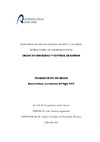Identificador persistente para citar o vincular este elemento:
https://accedacris.ulpgc.es/jspui/handle/10553/97816
| Campo DC | Valor | idioma |
|---|---|---|
| dc.contributor.advisor | Gómez Izquierdo, Luis | - |
| dc.contributor.author | Brito Pérez, Guacimara | - |
| dc.date.accessioned | 2021-03-11T00:31:51Z | - |
| dc.date.available | 2021-03-11T00:31:51Z | - |
| dc.date.issued | 2018 | en_US |
| dc.identifier.other | Gestión académica | - |
| dc.identifier.uri | https://accedacris.ulpgc.es/handle/10553/97816 | - |
| dc.description.abstract | El terrorismo constituye una de las amenazas más graves para la paz y seguridad internacional, atribuyéndose a los atentados perpetrados con agentes biológicos como la nueva forma de terrorismo del siglo XXI. A pesar de que la investigación sobre bioterrorismo es un tema complejo, este Trabajo de Fin de Grado demuestra que este tipo de ataques cuenta con una dilatada existencia a lo largo de la historia, siendo su probabilidad de materialización a gran escala baja, a pesar del temor que infunde en la población. Se analizan cuestiones como la planificación, la financiación y el tipo de conocimientos y tecnología necesaria para poder llevar a cabo un atentado bioarmamentístico de consecuencias mundiales, la importancia del respaldo gubernamental y de la normativa que lo ampara, concluyendo que la principal amenaza bioterrorista parte de los propios Estados. Con las aportaciones descubiertas se establecen las estrategias referentes a la prevención, detección y respuesta gubernamental para proteger a la población mundial de una posible amenaza bioterrorista. | en_US |
| dc.description.abstract | Terrorism constitutes one of the most serious threats to international peace and security, attributing to the attacks perpetrated with biological agents such as the new form of weapons developed by terrorism of the 21st century. Although research on bioterrorism is a complex issue, this TFG shows from the historical analysis that this type of attacks has a long existence throughout history, being the probability of large-scale materialization low, despite the fear that infuses in the population. Through the analysis of issues such as planning, funding and the type of knowledge and technology needed to carry out a bioarmamentist attack of global consequences, the importance of government support and the regulations that protect it, concluding that the main bioterrorist threat comes from the States themselves. With the contributions discovered, the strategies indicated for the prevention, detection and government response are established which will protect the world population from a possible bioterrorist threat. | en_US |
| dc.language | spa | en_US |
| dc.subject | 610901 Prevención de accidentes | en_US |
| dc.title | Bioterrorismo ¿La amenaza del Siglo XXI? | en_US |
| dc.type | info:eu-repo/semantics/bachelorThesis | en_US |
| dc.type | BachelorThesis | en_US |
| dc.contributor.facultad | Estructura de Teleformación ULPGC | en_US |
| dc.type2 | Trabajo final de grado | en_US |
| dc.utils.revision | Sí | en_US |
| dc.identifier.matricula | TFT-50115 | - |
| dc.identifier.ulpgc | Sí | en_US |
| dc.contributor.buulpgc | BU-TEL | en_US |
| dc.contributor.titulacion | Grado en Seguridad y Control de Riesgos (No Presencial) | - |
| item.fulltext | Con texto completo | - |
| item.grantfulltext | open | - |
| Colección: | Trabajo final de grado | |
Visitas 5
127
actualizado el 10-ene-2026
Descargas
614
actualizado el 10-ene-2026
Google ScholarTM
Verifica
Comparte
Exporta metadatos
Los elementos en ULPGC accedaCRIS están protegidos por derechos de autor con todos los derechos reservados, a menos que se indique lo contrario.
